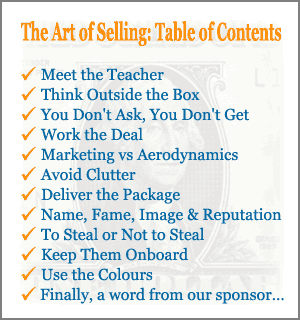
|
|

The Art of Selling: Sponsorship 101
|
|
|
By David Cameron, Italy
Atlas F1 Magazine Writer
|
 Table of Contents includes links to each chapter
Table of Contents includes links to each chapter
|
|
Sponsors leave a team for any number of reasons - their initial goals were met (or not) and the contract is finished; the company wants to move into other areas of marketing; or even that the team want to change their sponsorship slate for their own reasons. Ferrari rid themselves of a number of smaller sponsors last year and replaced them in a stroke with Vodafone, but this is not an approach that Wright necessarily agrees with.
"I don't really recall anyone we've booted out; that's not the way we do business. What we try to do is work with companies, and if you sell them a deal for a number of years then we will stand by that deal, and if someone came along offering more money for that position well we'd obviously try to keep them and put them in another position, or defer them for a year or whatever until the contract ran out. But Frank, the way he does business is a deal is a deal, and if it's signed that's what we did and we deliver it. We would never ever renege on a deal - that's something we would never do." The other side of these comments is that sometimes sponsors need to renegotiate or renege on a contract for reasons not of their choosing, for example if the economy turns and the company's fortune flounder. Most teams have suffered this problem at some time over their existence, but there is an alternative to letting them walk away and leaving a team empty handed. "If a company had been an on-car sponsor but were struggling or going through hard times and were not really able to stay in that on-car position or whatever, we might offer them the opportunity to downgrade, and one such example is Reuters, who had done three years with us on-car.
"We really do pride ourselves on our ability to work with our sponsors, and the reverse of that is Petrobras - they started with us as an official supplier back in 98, and look at them now - they've got major branding within the team, they're a major partner of the team, and that's because we worked with them and brought them up. And clearly we're delivering more value, giving greater resources, greater benefits, but they've scaled up their investment with us as they've seen how it can work for them." One problem that can arise with sponsors is when they associate themselves more with a driver than the team, as this can bring about a potential conflict of interest between the sponsor and the team. An example of this can be seen with the Jordan team - when they sacked German driver Heinz-Harald Frentzen it is thought that sponsor Deutsche Post were very unhappy, and certainly they did not renew their contract with the team at expiry. It's a problem that Wright is adamant his team will not face: "we avoid that at all costs, because we have to have the best drivers regardless of creed, colour or religion. We do not discuss this with sponsors when considering drivers for the next year." This is not to say that he will not discuss potential problems with a sponsor, particularly in the face of media discussion. The media is currently in a frenzy over Juan Pablo Montoya's future, with reports suggesting he could move from Williams to McLaren as early as next year. Wright will no doubt contact the sponsors to keep them up to date with events, so that they present a unified front. "From the outset we try to make a situation where our sponsors don't have a knee jerk reaction. For example, (German tabloid) Bild published some pictures of Budweiser's logo on the car before the official announcement, and we asked them to leave it to the team to deal with it. "We inform our sponsors before any announcement so they are informed - it's a matter of trust, and they realise we act in a responsible way. It comes down to a lot of communication, both one on one and in the quarterly sponsor workshops." © 2007 autosport.com
. This service is provided under the Atlas F1 terms and conditions.
Please Contact Us for permission to republish this or any other material from Atlas F1. |
|